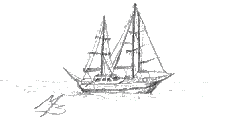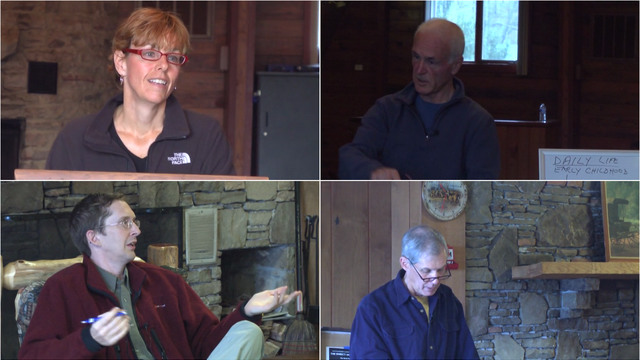
This month’s contents include:
Convictions & Concerns: Spiritual Procrastination, by Ben R.
TAT Foundation News: Including the calendar of 2025 TAT events and a listing of local group meetings organized by TAT members. * * * Many new audio clips from TAT in-person meetings and virtual events have been added to the members-only section! * * *
Humor
Inspiration & Irritation
Reader Commentary: … How do you know if an illusion is being projected upon you?
Founder’s Wisdom
A New Home for TAT update: In-person TAT gatherings will be held at the Claymont Retreat Center in 2025.
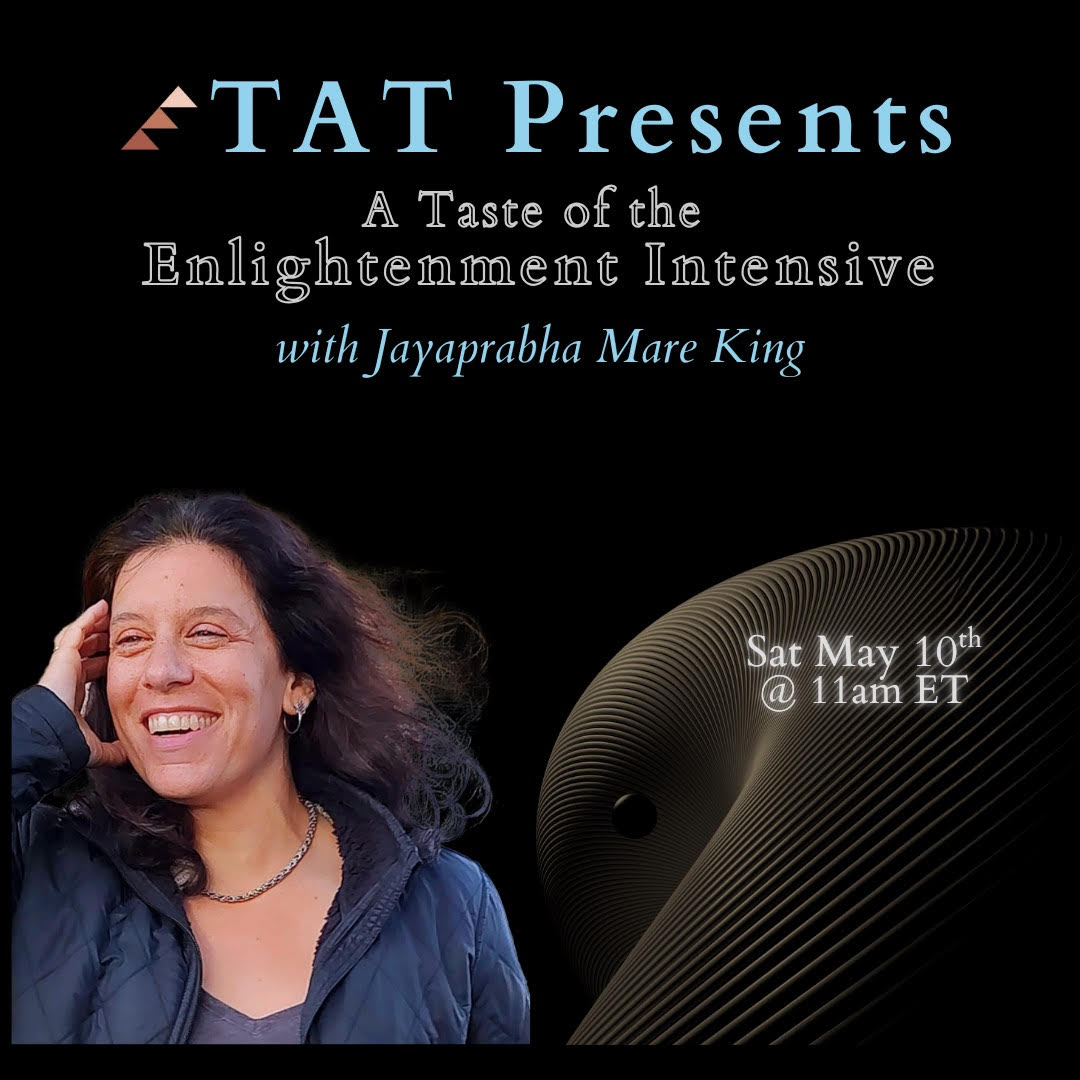
Free virtual event.
Saturday, May 10, 2025
More information and registration.


(As an Amazon Associate, TAT earns from qualifying purchases made through links on our website … or save this link to use.)
Convictions & Concerns
TAT members share their personal convictions and/or concerns

Spiritual Procrastination
I recently read a book by procrastination researcher Dr. Fuschia Sirois simply called Procrastination and have been trying to digest it and make it useful for my therapy clients who might struggle with patterns of procrastination. As I’ve been learning more about how procrastination works, though, I’ve also been wanting to apply it to the spiritual search. I know procrastination is an ongoing struggle for me, and I believe it most likely is for a lot of others too. As Richard Rose said in The Albigen Papers, “we can expect to battle the urge to procrastinate from now on.”
How Procrastination Works
Dr. Sirois describes procrastination as ultimately a matter of trying to manage emotions, rather than an issue of will-power, motivation, time management, or discipline. Basically, when we think of an upcoming task and have uncomfortable emotions like frustration, anxiety, uncertainty, boredom, or stress, procrastination comes in as a way to reduce this discomfort. It works in the short-term, but ends up just creating more negative emotions in the long-term, thereby creating a kind of cycle or feedback loop. After procrastinating, we end up back where we started, with more uncomfortable emotions to be managed, but having lost time in the process.
There are some things that can amplify this process and make it more likely. One is if we have perfectionistic and unrealistic expectations, which tend to create pressure and give rise to more negative emotions when things don’t go perfectly. Another is when we have a distant sense of our future self, making it easier to offload the current task onto that future self to deal with.
Read More
~ Thanks to Ben R. Image generated by chatgpt-picture-generator from the prompt: Spiritual procrastination. Please email reader commentary to the TAT Forum.


TAT Foundation News
It’s all about “ladder work” – helping and being helped
Richard Rose, the founder of the TAT Foundation, spent his life searching for the Truth, finding it, and helping others to find their Way. Although not well known to the public, he touched the lives of thousands of spiritual seekers through his books and lectures and through personal contacts with local study groups that continue to work with his teachings today. He felt strongly that helping others generates help for ourselves as well in our climb up the ladder to the golden find beyond the mind.

Call To Action For TAT Forum Reader

With the intention of increasing awareness of TAT’s meetings, books, and the Forum among younger serious seekers, and to increase awareness of ways to approach the search for self-definition, the TAT Foundation is now on Instagram.
You can help! A volunteer is producing shareable text-quote and video content of Richard Rose and TAT-adjacent teachers. We need your suggestions for short, provocative 1-3 sentence quotes or 1 minute or less video clips of people like Rose, Art Ticknor, Bob Fergeson, Tess Hughes, Bob Cergol, Bart Marshall, Shawn Nevins, Anima Pundeer, Norio Kushi, Paul Rezendes, Paul Constant, & other favorites. (An example here is selected by the TAT member who volunteers to oversee the Instagram account.)
Please send favorite inspiring/irritating quotes—from books you have by those authors, from the TAT Forum, or any other place—to TAT quotes. If you have favorite parts of longer videos (ex: from a talk at a past TAT meeting), please email a link to the video and a timestamp.
Thank you!

TAT Foundation Press’s latest publication
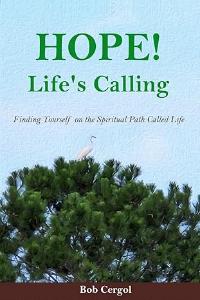
Hope! Life’s Calling: Finding Yourself on the Spiritual Path Called Life is a profound exploration of self-inquiry, personal clarity, and the search for life’s deeper meaning. The book invites readers to confront their deepest questions and engage in a journey of self-discovery, offering hope for understanding one’s true nature and purpose. Paperback and Kindle versions are available, and the audiobook is now available for purchase in the Amazon Store and on Audible.
“A one-of-a-kind guidebook written for the person who sincerely wants to discover their essence—to learn who or what they truly are at the core….” ~ Tara
“A masterpiece of a wake-up call, really a slap-in-the-face to almost all the books out there in the spiritual marketplace that claim to offer some variation of the perennial wisdom needed to seek Truth, Reality, Essence or Source….” ~ bk
Read their full reviews on Amazon. And please add your review to the Amazon listing. It makes a difference!
*
Other TAT Press publications also available as audiobooks:
1. Passages: An Introduction and Commentary on Richard Rose’s Albigen System
2. Solid Ground of Being
3. Beyond Relativity: Transcending the Split Between Knower and Known
4. The Listening Attention
5. Falling for Truth: A Spiritual Death And Awakening
6. This Above All: A Journey of Self-Discovery
7. A Handyman’s Common Sense Guide to Spiritual Seeking
8. Always Right Behind You: Parables & Poems of Love & Completion
9. Pouring Concrete: a Zen Path to the Kingdom of God
10. At Home with the Inner Self
11. Sense of Self: The Source of All Existential Suffering?
12. Message in a Bottle: Reflections on the Spiritual Path
*
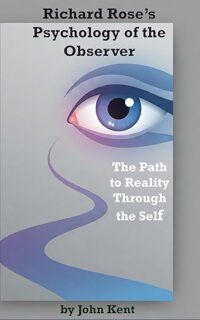
Now available as a Kindle edition. Also available to read online and in .pdf format on SelfDefinition.org and SearchWithin.org.

|
Random rotation of |

2025 TAT Meeting Calendar
January TAT Talks online event: Sunday noon, January 12, 2025
April Gathering: Friday evening through Sunday noon, April 25-27, 2025
May TAT Presents online event: Saturday May 10, 2025 at 12 PM ET
June Gathering: Friday evening through Sunday noon, June 27-29, 2025
July TAT Talks online event: TBD
August Gathering: Friday evening through Sunday noon, August 22-24, 2025
September Virtual Gathering: TBD
October TAT Talks online event: TBD
November Gathering: Friday evening through Sunday noon, November 7-9, 2025
December TAT Talks online event: TBD
TAT has decided to sell the Hurdle Mills, NC property and find property better suited for our needs. In the meantime, beginning in April, we will be having our in-person gatherings at the Claymont Retreat Center in Charles Town, WV.
Comments or questions? Please email TAT Foundation events.



TAT’s YouTube Channel
Have you seen the TAT Foundation’s YouTube channel? Subscribe now for spiritual inspiration (and irritation)!
Volunteers have been updating the channel with hours of new content! They’ve also curated some great playlists of talks by Richard Rose, teacher talks from recent & not so recent TAT meetings, episodes of the Journals of Spiritual Discovery podcast, and other great TAT related videos from around the internet.
Featuring: Richard Rose, Bob Cergol, Shawn Nevins, Bob Fergeson, Mike Conners, Anima Pundeer, Norio Kushi, Paul Rezendes, Bob Harwood, Tess Hughes, Art Ticknor, Shawn Pethel, Tyler Matthew and other speakers.
This month’s video is another of the dialectical sessions with panels of “finders” in the November 2022 TAT gathering:

Local Group News
(Groups with recently updated information are listed first. Click the “read more” link to see a complete listing of local groups. )

 Update from the Ireland self-inquiry group:
Update from the Ireland self-inquiry group:
Meetings predominantly are online at present so it is open to anyone across the globe who can make 7pm GMT. We meet every Wednesday evening for an hour starting at 7pm. The meetings are discussion based where the speaker is open to be questioned on his/her feelings, beliefs, perspectives, etc. Generally, meetings look to carry on the conversation of the previous meeting by picking out some topic that seemed to spike most interest during the meeting. In the description of the meetings there will be links to material, generally from the TAT Forum, to be studied before the upcoming meetings. Participants can give their reaction to the piece or whatever is coming up for them that they feel is pertinent to their own path. We make efforts to meet up occasionally with the aim of creating and developing regular in-person meetings, possibly to be held in the Dominican Retreat Centre, Tallaght, Dublin. Here is a link to the group where you can get an idea of the topics we talk about; the Meetup page gives a history of all the previous meetings that we had, which should give a good idea of what the group is about and if this is something you would like to participate in: Philosophy; Self-Inquiry Group | Meetup . ~ Contact for further information.

 Update for the Online Self-Inquiry Book Club:
Update for the Online Self-Inquiry Book Club:
We’ll continue to meet at 2 PM ET, new meeting URL: https://zoom.us/j/92613150566?pwd=IR1gBHVCfaD02TjzbEbW5VbGM1f35j.1 and invite anyone interested in the topics to read the section and attend! We’re doing a split of the Happiness and Art of Being by Michael James and The Direct-Mind Experience by Richard Rose for the Book Club. Upcoming schedule:
May 4: Happiness and the Art of Being, Part 2 of Chapter 5, What is True Knowledge? p. 291-358
May 18: Happiness and the Art of Being, Chapter 6, True Knowledge and False Knowledge, p. 359-392
May 25: Direct Mind Experience, Lecture at Boston College 1975
June 1: Happiness and the Art of Being, Chapter 7, The Illusion of Space and Time, p. 393-416
June 15: Happiness and the Art of Being, Chapter 8, The Science of Consciousness, p. 417-434
June 29: Direct Mind Experience, August Chautauqua
July 6: Happiness and the Art of Being, Part 1 of Chapter 9, Self-Investigation and Self-Surrender, p. 435-488
July 20: Happiness and the Art of Being, Part 2 of Chapter 9, Self-Investigation and Self-Surrender, p. 435-488
July 27: Direct Mind Experience, The Psychology of Miracles
The Happiness book continues to have occasional “Easter Eggs” or glimpses of great value, justifying the reading effort when it could arguably be half the number of pages. A few people have reported that voice-to-text has made its writing style more accessible.
For a quick example of what’s been valuable, Michael James’s impressions of Ramana Maharshi’s teaching seemed to spark a couple of “aha’s” in the context of whether the mind has a role in seeking beyond the mind:
“the thought ‘who am I?’ [that is, the effort we make to attend to our essential being], having destroyed all other thoughts, will itself in the end be destroyed like a corpse-burning stick [that is, a stick that is used to stir a funeral pyre to ensure that the corpse is burnt entirely]”
And for a longer example, a few sentences later:
“As soon as each thought appears, if [we] vigilantly investigate to whom it has occurred, ‘to me’ will be clear [that is, we will be clearly reminded of ourself, to whom each thought occurs]. If [we thus] investigate ‘who am I?’ [that is, if we turn our attention back towards ourself and keep it fixed firmly, keenly and vigilantly upon our own essential self-conscious being in order to discover what this ‘me’ really is], [our] mind will return to its birthplace [the innermost core of our being, which is the source from which it arose]; [and since we thereby refrain from attending to it] the thought which had risen will also subside. When [we] practise and practise in this manner, to [our] mind the power to stand firmly established in its birthplace will increase.”
And later, James explains:
“Because he first says, ‘if [we] vigilantly investigate to whom this [thought] has occurred’, and then in the next sentence says, ‘if [we] investigate who am I’, some people wrongly mistake him to mean that we should first ask ourself to whom each thought has occurred, and that after remembering that it has occurred to me, we should then ask ourself who this ‘me’ is, or ‘who am I?’. In fact, however, since by the mere remembrance of ‘me’ our attention turns back towards ourself, we do not then need to do anything further except to keep our attention fixed on ourself.
“Since we can investigate ‘who am I?’ only by scrutinising or attending to our consciousness of our own being, which we always experience as ‘I am’, the mere remembrance of the ‘me’ to whom each thought occurs is itself the beginning of the process of investigating ‘who am I?’. Thus all we need do after remembering that ‘this thought has occurred to me’ is to keep our attention fixed on that ‘me’.”
“Can you turn your attention back toward yourself?” was a question based on this at the DC Self Inquiry Group.

 Update from the Pittsburgh, PA self-inquiry group:
Update from the Pittsburgh, PA self-inquiry group:
> Use the e-mail link below for invitations to all meetings and to receive internal email announcements.
> In-person bi-weekly meetings: This month: Aladdin’s Eatery, 5878 Forbes Ave, Squirrel Hill, PGH 15217 (look for red raincoat on the back of a chair!).
– Mon, May 5, 7-9 PM: Dean F. “What Really Motivates You?”
– Mon, May 12, 7-9 PM: “Can you Experience Paradox?”
> Online group confrontation and individual contributions every Wed, 8:00 pm EDT via Zoom:
– Wednesdays, May 7, 14, 21, 28
> All Forum subscribers are welcome to join us.
Email to receive weekly topics with preparatory notes and Zoom invitations. Current events are listed on Meetup as Pittsburgh Self-inquiry Group and on www.pghsig.org.


Members-Only Area
A password-protected section of the website is available for TAT members. (Note that there’s an occasional glitch that, when you try to link to the members-only area or a sections within it, you’ll get a page-not-found error. If you try the link a second time, it should work.) Contents include:
- How you can help TAT and fellow seekers,
- Audio recordings of selected sessions from 2008-and-on in-person meetings and virtual gatherings.
Resources and ideas for those planning a group spiritual retreat.
- Photographs of TAT meeting facilities, the Richard Rose grave site, a rare 1979 photo, and aerial photos of the Rose farm,
- Presenters’ talk notes from April TAT meetings in 2005–2007, and
- TAT News Letters from 1996–2013 and Annual Retrospectives from 1973 thru 2011. The Retrospectives from 1973–1985 were written by Richard Rose and are replete with ideas on the workings of a spiritual group—rich historical content.
- TAT policies, TAT business meeting notes, and other information.
New audio recordings added:
- December 2023 TAT Talk with Mike Gegenheimer.
- January 2024 TAT Talk with Bob Harwood.
- February 2024 TAT Virtual Event — Death, Dying, and Beyond.
- March 2024 TAT Talk with Norio Kushi.
- April 2024 in-person TAT Meeting.
- May 2024 TAT Talk with Paul Constant.
- June 2024 in-person TAT Meeting.
- July 2024 TAT Talk with Art Ticknor.
- August 2024 TAT Meeting – Running Between the Raindrops.
- September 2024 TAT Virtual Retreat – Love, Self-Inquiry, Prayer: Three Paths or One?
- October 2024 TAT Talk with Shawn Nevins.
Please us if you have questions. (Look here for info on TAT membership.)

Amazon and eBay
Let your Amazon purchases and eBay sales raise money for TAT!
As an Amazon Associate, TAT earns from qualifying purchases made through the above link or other links on our website. Click on the link and bookmark it in your browser for ease of use.
TAT has registered with the eBay Giving Works program. You can list an item there and select TAT to receive a portion of your sale. Or if you use the link and donate 100% of the proceeds to TAT, you won’t pay any seller fees when an item sells and eBay will transfer all the funds to TAT for you. Check out our Giving Works page on eBay. Click on the “For sellers” link on the left side of that page for details.

Downloadable/rental versions of the Mister Rose video and of April 2012 TAT sessions on Remembering Your True Desire:
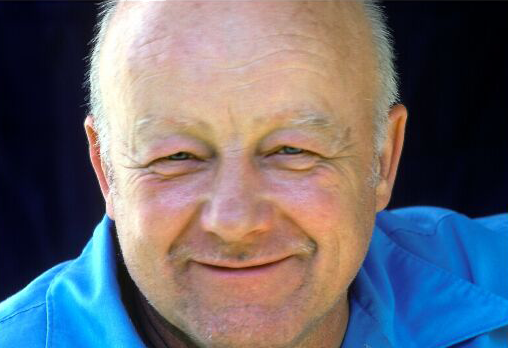

Your Contributions to TAT News
TAT founder Richard Rose believed that working with others accelerates our retreat from untruth. He also felt that such efforts were most effective when applied with discernment, meaning working with others on the rungs of the ladder closest to our own. The TAT News section is for TAT members to communicate about work they’ve been doing with or for other members and friends. Please your “ladder work” news.


Humor {(h)yo͞omər}
“One thing you must be able to do in the midst
of any experience is laugh. And experience
should show you that it isn’t real, that it’s a
movie. Life doesn’t take you seriously, so why
take it seriously.” ~ Richard Rose, Carillon

Fastest Land Mammal

*
~ El Arroyo Restaurant signs (Austin, TX).
.![]()
Enlightened Humor

SUCCESSFUL SERMON
“The secret of a good sermon is to have a good beginning and a good ending, and to have the two as close together as possible.” –George Burns
* * *
GOD’S LAUGHTER
How do you make God laugh? Speak of your plans.
* * *
OLD MONK TO YOUNG MONK
On the terrace of a monastery high in the mountains, an old Buddhist Zen master stood next to a much younger monk while they both contemplated the great Void of misty space out yonder. The old monk at one point gently declared: “Ah, my son, one day all of this (Void) will be yours.”
* * *
SCARY GPS
A friend visiting another town wanted to pay respects at the grave-site of a relative whose funeral he had not been able to attend. He used his smart-phone’s GPS navigation system to find the cemetery. As he drove into the peaceful place, the female voice on the GPS announced, “You have arrived at your final destination”!
*
~ Thanks to Enlightened-spirituality.org. AI art generated by Midjourney on Reddit. “Midjourney is an image generator that lets you explore new ideas that unlocks your creativity.”

Procrastination

*
~ Thanks to Dan G. From a poster for sale.


Inspiration & Irritation
Irritation moves us; inspiration provides a direction

Quotes for Seekers

“Often the best (and hardest) thing to do is nothing: let’s just keep watching for now.” – from an article describing a possibly unwarranted bias towards action in medical care (e.g., running unnecessary tests). I think there have been times in my life when I felt a great degree and angst and got similar advice from spiritual friends: if you don’t know what to do, just watch and see what happens.
![]()
“Perhaps the most accurate conclusion is that sometimes less is more, sometimes more is more, and often we just don’t know.” – from the same article on when doctors should act in medical cases. It reminds me of the seeker’s conundrum: we don’t know if any of our efforts have any affect, and we don’t know how an alternative path, decision, or life would work out. We just don’t know.
![]()
“It’s easy to do if you don’t know what you’re doing.” – from an article about becoming a writer. The corollary is that as spiritual seekers we may have ideas about what spirituality is, who we are, and what a spiritual path looks like. Those ideas may be beliefs that slow down our progress to honest and humble ignorance about what we know.
![]()
“Writing is life driving at night in the fog. You can only see as far as your headlights, but you can make the whole trip that way.” – attributed to E.L. Doctorow in that same article about writing. It reminds of my life, which may or may not make sense in retrospect, and of living with uncertainty; I have no idea where I’m going in a relative sense or otherwise; I don’t know how things will turn out; but the hopeful message is that if I take one step at a time it’s possible to “make it.”

~ Thanks to Brett S, who commented: “I was reading some books reviews and came across some quotes that I thought might apply to spiritual seekers (which my phone autocorrected to ‘pitiful’ seekers, which seems more accurate lol).” He also expressed his thanks to the TAT Forum and the TAT community. Driving on a foggy night image thanks to freepik.com.

What’s Worth Doing?

“The world pushes us to add, because that benefits them. But the secret is to focus on subtracting.”
See this extract on “Subtract” from Hell Yeah or No: What’s Worth Doing by Derek Sivers, which can also be ordered directly from the author @ Hell Yeah or No.

~ Thanks to Shawn Nevins, who added: “Here’s another vote for the way of Subtraction. :-)” Image generated on writecream.com/chatgpt-picture-generator.

Notes From Shawn Pethel’s Talk: “Spiritual Path as a Creative Endeavor”

A Spiritual Path as a Creative Endeavor similar to how an artist follows their inspiration, their muse
*
Drawing as a creative process, originates in the right-side of the brain, but the left wants to frame it as to how you think, replacing it with its abstraction
*
The key is to just look, and to see only what arises. Seeking is only looking, to put your attention on it, without adding
*

~ Thanks to Bill K, who made these notes from Shawn’s presentation at an online event of the Pittsburgh, PA self-inquiry group on Feb. 26, 2025. The Tetrahedron, Ruhr, Bottrop image is from PublicDomainPictures from Pixabay.

Your Brain: Perception Deception
“Is what you see real? Join neuroscientist Heather Berlin on a quest to understand how your brain shapes your reality, and why you can’t always trust what you perceive.” 54-minute Nova / PBS video. “What Is Consciousness?” starts at 30:28.
48:44
FENTON: We’re stuck with the problem of, how do we know what is true? How do we know what’s real?
50:01
MARTINEZ-CONDE (chuckles): Trust the illusion, that’s the only thing that we can be sure of, that what we perceive is not what’s there.
51:14
I think it’s liberating to understand that we rise from this organization of matter.
51:34
All of that is inscribed in our brains. SAXE: Sometimes when I wonder what I’m doing with my life,
51:42
I think how is it that a spatial and temporal pattern of electrical signals passing between cells in our brains makes us who we are? That just being a part of the team asking that question is worth keeping going for.

Please your thoughts on the above items.


Reader Commentary
Encouraging interactive readership among TAT members and friends
A reader wrote that what would make the Forum more interesting would be:
Hearing from people who are searching—and have questions instead of those providing endless advice and “answers.” What challenges they are facing. What their doubts and questions are. How they perceive their path is going. What they are doing in their lives. Where they think they will end up, etc., etc.
Can you help make the Forum more interesting?

The Reader Commentary question for the May TAT Forum from Dan G. is:
In “The Pregnant Witch” story, Richard Rose describes a reaction:
For a second, I felt a flash of fear, and a strange rush occurred like a chill throughout my nerves. I thought, “I had better get myself braced for this show.” I reminded myself that I was witnessing an illusion that was somehow being projected upon me, and knew that I did not dare to indulge in belief.
What could he have meant by “I did not dare to indulge in belief”? Is this a legitimate response to all fear? How do you know if an illusion is being projected upon you?
Responses follow:

From Ricky C:
I would break this down as follows:
What is a belief?
What is indulging?
A belief is a thought we have about ourselves or the world which shapes our identity. This is the false self but also has a kind of false reality, which is a subset of actual reality where it is just a show. Just as an actor takes on a false identity in a show inside the paradigm of the actors and the set and props, there’s an internal consistency which is a kind of reality. When you zoom out and see it is all a production, it is laughably all fake, but this kind of zoomed out awareness isn’t the norm.
From Dan McLaughlin:
I bias he’s referring to the felt presence of doubt as the necessary counterweight to belief’s indulgence.
Observation strikes me as reflexive memory with varying degrees of reality—reality defined by shared consensus or recorded evidence of occurrence. Memory doesn’t require something to have actually happened.
Rose’s stance reveals what I see as the protective function of doubt. In “The Pregnant Witch,” when confronted with the inexplicable, he creates distance between perception and interpretation. Doubt exists in my personal experience as a felt notification that “something’s not quite right.” Its natural response is questioning and with this desire refinement. Seduction being less likely as a result.
This isn’t mere skepticism but a sophisticated metacognitive awareness. By refusing to “indulge in belief,” he’s avoiding premature meaning-making, creating that crucial buffer between experience and interpretation.
Is this legitimate for all fear? This would depend on what you want.
How do you know if an illusion is being projected? You don’t—certainty is admitted as absent in the presence of doubt. What emerges instead are your actual beliefs, maintaining a remembrance of yourself within the context of events beyond the most immediate happenings influence.
From Patrick K:
My feeling is that belief is of the mind. When you believe, you automatically identify with the mind, and then hypnotism can use the mind to control the body/mind organism perhaps? Is all belief an insanity? Is belief an activating mechanism of mind and body which moves it, a manipulator of body/mind, making it contort this way and that way, beyond what is natural? But then I feel that a conviction state is necessary for an individual to hold his head on straight, and conviction is a kind of more internalised belief. I guess for me, it’s about being cognisant of these inner convictions at a more “process observer” level than an umpire level (fears/desires) where I am more bodily involved with beliefs in a reactionary sense.
I just happened upon a quote from Richard Rose which I find is sticking with me, “But the view is not the viewer. And you continue in this, but what happens is that you suddenly get an overview of exactly who you are and what your purpose is. And all this mechanism below seems to be some definite fog that’s been put between you and this, so that you’ll be a good fertilizer. Our purpose here as I can see it, in the final analysis on the natural level, we are nothing but fertilizer….” ~ April 2016 TAT Forum. More than any eeriness that comes from the “Pregnant Witch” story, I feel that really that statement by Rose is much more eerie when it comes to my self-definition, especially the part, “some definite fog that’s been put between you and this.”
Who is the master hypnotiser that puts this fog between me and the Truth? Is it Nature? How can I fully appreciate this illusory fog that’s been projected upon me to gain the impetus to get that overview Rose speaks of? What magic, or otherwise, ingredient am I missing, what jigsaw piece can I not see that will create this dance between the “process observer” and “awareness,” that will draw me above the fog that Rose mentions, in the above link, as the important part in climbing Jacob’s ladder all the way?
From Anima Pundeer:
What could he have meant by “I did not dare to indulge in belief”? Is this a legitimate response to all fear? How do you know if an illusion is being projected upon you?
I was doing a solitary retreat in Bob Cergol’s cabin in the winter of ‘99. The only part I hated about these retreats was going to the outhouse to pee after dark. I would psyche myself by thinking I would not let my mind trigger any fear reaction. It required a certain restraint on the thoughts and needed to be redirected in another direction.
I don’t think I can know for sure if the illusion is being projected. I have noticed a certain unease that can’t be ignored in situations.
Our underlying desires and fears make us susceptible to being influenced and controlled by someone who promises their fulfillment.
From lennys3cents:
What could he have meant by “I did not dare to indulge in belief”?
he knew if he did indulge in belief he would have already been sucked back (identified) into the “Picture-Show”. (the easiest thing is to fall into beliefs (addiction) … the hardest: turning/retreating/letting go of/rising above beliefs (this is accomplished by Becoming))
Is this a legitimate response to all fear?
This has nothing to do with fear… fear is a non-existent concept (like darkness).
How do you know if an illusion is being projected upon you?
nothing is projected upon us… ALL experience is our “egoic projection/interpretation/illusion of The Real” (ALL & EVERYTHING is a projection of The-REAL)… the biggest illusion is: there is an illusion
From Art Ticknor:
When we’re impressed by what we’re experiencing and strongly inclined to get absorbed into it, we may get a sign from memory or unseen help to be cautious—especially if it involves the libido (which Rose pronounced in the Ecclesiastical Latin mode of li-bi-do with a short “i” and emphasis on the first syllable). I think he was describing a caution sign to remain detached.
I’d say it was a good response to the fear of “sleepwalking”—like the fear of walking in front of a moving vehicle when crossing the road if not alert. If his fear had been greater, his decision-making machinery could have resulted in physical action—like turning around and not walking down a dark street rather than continuing with caution.
An illusion is commonly defined as something likely to be wrongly perceived or interpreted by the senses. Sticking with the paradigm of “reality” as particles of matter existing in and around us, which we sense by seeing—for example, when light bounces off them, hits our eyes, causing electrical-chemical reactions that create images in our visual cortex—we’d have to experience something where an image we’d misinterpreted was shown to be wrong—for example, seeing the image of water ahead of us turning out as a mirage, an illusion.
Illusion could be inherent in the paradigm that the “solidity” we experience is real. The cosmos of experience may be a holographic projection coming out of consciousness. For the seeker of Truth, the delusion of certainty is more problematic than illusory perceptions.
From Jonathan P:
I experienced a projection years ago in a darshan with a yogi I admired, more, tried to be devoted to. He had me stand up and said he would demonstrate projection of the sense of smell. I suddenly experienced as if a whole tub of pure turmeric powder was poured over my head, flowing all over me. The yogi then said, “He is smelling turmeric.” I was silently astounded, took my seat, and the smell gradually disappeared. The yogi had given me no prior indication, that I knew of, of what smell would be projected.
It seems that we all share a common agreement about reality programmed into us through authorities’ example, language and commonality of culture. But although Mr. Rose’s and the “witch’s” views may have had some shared qualities underpinned by common belief—that sexual attraction can blind and control men, that it’s possible to influence others directly mentally, he saw through his mind’s beliefs and could actively step back or turn away attention from the desire-belief to be bewitched. So, beliefs underpinning this present view are the hooks for projection, maybe a wish to be conned by an authority to make one safe, even the continuous projection of an I controlling a known, safe, solid world.
For me, I wanted to be influenced by that yogi, that he’d deliver the goods I craved. Maybe that I could one day have power like him. My mind was porous, obedient, passive to mental force. I could not turn from projection, see through it, choose to surrender or not. I didn’t want to. A question for me now is, are things really different for me now? To what beliefs about myself am I passive, that blind me and underpin this sleep?

The Reader Commentary topic for next month, the June TAT Forum, is:
Feedback from participants in the May 10th TAT Presents “Taste of the Enlightenment Intensive” virtual event or from participants in intensives offered by the featured speaker, Jayaprabha Mare King.
Please your response by the 25th of May, and indicate your preferred identification (the default is your first name and the initial letter of your last name). “Anonymous” and pen names are fine, too.
PS: What question(s) would you like to ask other TAT Forum readers?

Q: What are your thoughts on this month’s reader commentary? Please your feedback.

Richard Rose described a spiritual path as living one’s life aimed at finding the meaning of that life. Did you find anything relevant to your life or search in this month’s TAT Forum?

Death Valley, CA sand dunes. October 2019 photo by Art Ticknor.

We like hearing from you! Please email your comments, suggestions, inquiries, and submissions.
Sign up for notices of TAT’s four annual events, other virtual events, and free monthly Forums on our contact page.


Founder’s Wisdom
Richard Rose (1917-2005) established the TAT Foundation
in 1973 to encourage people to work together on what
he considered to be the “grand project” of spiritual work.
Zen
Essay from Carillon: Poems, Essays & Philosophy of Richard Rose

Part 2 of 3 (see the first part of the essay in the April 2024 TAT Forum):
I find that that which matters is Truth, and that which we choose as an instrument for digging out the Truth should be that which is more effective upon understanding of the aspirant of listener.
With this I am saying that, while some enlightened men evolved from esoteric Christian groups, their importance and significance has been lost because of the negative mental pictures with which many Christians have colored and endowed the word “Christian.” There is also the factor that many sincere minds are charmed more by esoteric terminology and foreign teachers. It is the “Grass is greener on the other side of the fence” syndrome.
Man cannot hear unless he has ears. But by the same token, man dances to the tune of different drummers because his ears are tuned to different receptions. So it may be advisable for the teacher at times to bend his language to the ears of the students who are eager and sincere. This should never be interpreted as being an excuse for a compromise—a compromise with erroneous or biased thinking.
I would like to give at this time also my attitude toward other systems. It is foolish to denounce other systems merely because they exist, and because we see no agreement with their method. It is likewise cowardly to fail to denounce any system that functions under a false pretense, and which in so doing, consumes the valuable young years of a student’s life in repayments for that student’s trust and faith. Of course we may be tempted to say that people without the proper vision deserve to be duped, but such thinking only spells the doom and hopelessness for future generations of which we are the seed, physically and spiritually.
We must discriminate, even as Buddha enjoined. We must point out error and denounce deliberate spiritual chicanery. We cannot lie down with fornicators and remain pure. We cannot get into mutual back-scratching, or lie down with rationalization unless we wish to become dishrags.
We can only find Truth by retreating from untruth, not by postulating a “Truth” that we achieve by visualization rather than by realization. In Matthew 10:34, Christ gives his aims, pointing out that he is not an agent of peace but the agent of the sword. He is referring to the sword of discrimination. In Zen writings it is called the sword of Prajna.
To be continued….
*
=> Google’s AI Overview: In Buddhism and Hinduism, “prajna” (also spelled Prajñā) refers to wisdom, understanding, and insight. It’s not simply intellectual knowledge but a profound and intuitive comprehension of reality…. Image is from https://www.writecream.com/chatgpt-picture-generator using the first sentence in this part of the essay as the prompt.

Definition of Terms

Index of many of the key terms and principles in Rose’s work, with brief definitions, from Richard Rose’s Psychology of the Observer: The Path to Reality Through the Self by John Kent.

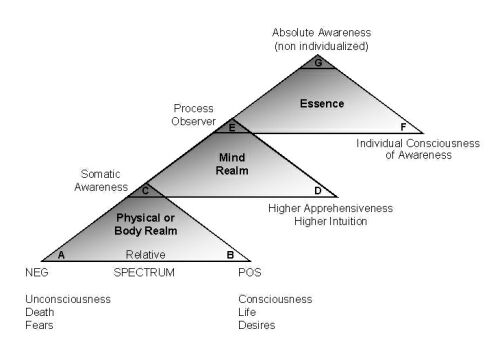
Jacob’s Ladder © 2001 Richard Rose. See this transcript of a talk on the topic by Rose.


Homing Ground Update
… A spot on earth where people can do retreats and hold
meetings; where the emphasis is on friendship and the search.

January 2025:
As we look to 2025 for a new year of TAT Retreats and Friendship on the spiritual path, there are a few important updates to share.
Since 2019 when we first moved into the current TAT Center, this home away from home has been developed and supported by many. Through donations, workdays, and the ongoing efforts of our caretaker, the property has served as a retreat center, a spiritual library, and a gathering place for friends. It would be difficult to sufficiently put into words how grateful we are for these efforts, contributions, and time together at the Hurdle Mills TAT Center, and for all who continue to support and have played a part in making the TAT Center a reality.
To enhance the ability for TAT to provide a center for meetings and retreats, after much careful consideration, discussion, and engagement with TAT members for input, we have strategically decided that, while the current TAT Center is very good, it is not as well-suited for the future as we would like. In the spring of 2025, the TAT Center will be for sale, and we will transition the 2025 quarterly TAT Meetings and Retreats to Claymont (Charles Town, WV) and other retreat facilities. A committee is actively looking at properties to find a future home for TAT.
A unique piece of land with a purposefully built retreat center building, acreage for solitary cabins, and a modest caretaker home is the view we have in mind. A place that feels more like a quiet retreat center than a large suburban home, and one that requires less ongoing live-in maintenance than our current home are additional items that have been discussed. The net is cast widely, but we are focusing on the Appalachian Mountain range for property searches, seeking the right balance of solitude and accessibility.
The right property will come when it is meant to, and we look forward to that next chapter for TAT. In the meantime, many have expressed a fondness for the Claymont center, and we intend to hold retreats there until a new property for TAT is found. Over the next few weeks, we will finalize dates for TAT’s 2025 Meetings and Retreats and announce them through January’s Forum and share them on the TAT website.
A very special thank you to all who have been involved in creating and supporting the Hurdle Mills TAT Center during the last five years, and likewise to those planning TAT’s future home. We look forward to the coming year of TAT Meetings and Retreats and very much hope to see you there.
In Friendship,
Michael, Shawn, and Mike
[our current trustees]
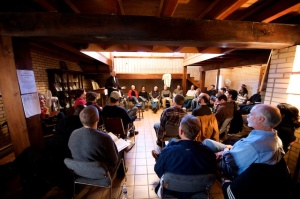
Did you enjoy the Forum? Then buy the book!
Readers’ favorite selections from seven years of issues.
Beyond Mind, Beyond Death is available at Amazon.com.

Home | Richard Rose | Books & Recordings | TAT Forum | About | Search | Site Map





 > The Women’s Online Confrontation (WOC) group consists of weekly reports where participants can include:
> The Women’s Online Confrontation (WOC) group consists of weekly reports where participants can include:








